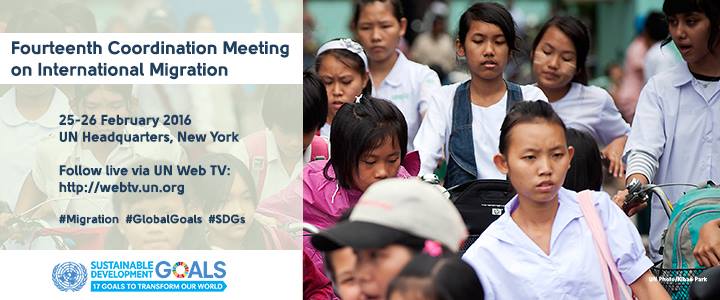4 mars 2016

On 25 and 26 February, the 14th annual coordination meeting on international migration has been held at the United Nations Department of Economic and Social Affairs (UNDESA) in New York.
Its three main objectives were to:
The particular aim of the meeting was to bring together entities of the United Nations system, other relevant intergovernmental organisations, civil society, researchers as well as Member States and to strengthen their collaboration. It is the largest annual gathering on migration at the United Nations.
The speech delivered by Bob van Dillen from Cordaid, representing MADE and speaking on behalf of the NGO Committee on Migration, focused on the role of civil society in moving forward the Agenda 2030.
Below you can read some extracts from the speech:
Civil Society largely shares the perspective the UNSG Ban Ki Moon states in his report: The reviews of the Agenda 2030’s implementation should be inclusive and participatory towards all relevant stakeholders. The Agenda 2030 eventually recognised many significant issues Civil Society has been promoting – though there is still work to be done.
Agenda 2030: UNSG on the role of civil society
Not only the UNSG but also the 2030 Agenda itself envisages strong participation of non-state actors in UN intergovernmental forums and bodies and inclusiveness in follow-up and review at the global level. E. g., the UNGA resolution 67/290 suggests extensive arrangements for further enhancing the participation of the major groups and other relevant stakeholders in the HLPF work. Such mechanisms we feel are important to ensure meaningful civil society participation. Another important step is the shadow report civil society organisations of 8 countries are producing to state their countries’ efforts and results in granting influence to the CSOs.
Commission on Population and Development
Civil society is also keen to engage in the work of the functional commissions of ECOSOC, significantly the Commission on Population and Development, where migration is reviewed as part of the Plan of Action of the 1994 International Conference on Population and Development (ICPD). In particular, the forty-ninth session of the CPD this April is an important opportunity to address situations of voluntary and forced displacement, and to ensure the social and economic integration of migrants, as set forth in Chapter Ten of the outcome document of the International Conference of Population and Development.
Global Forum on Migration and Development
The UNSG foresees a meaningful role in the follow-up and review process for fora outside the UN system, such as the GFMD. Civil society has long engaged with the GFMD process leading to productive civil society interaction with states. We recognise that the key is implementing practices that take discussions and recommendations like those that arise in the Global Forum forward with concrete, positive results. Such results will only be achieved if civil society participates in the discussions on the definition, implementation and monitoring of the recommendations and practices.
Setting a framework for global indicators
As with the IGN process, civil society has also engaged with the process of developing global indicators. Whilst civil society has been providing inputs on a regular basis, and appreciates the efforts of the IAEG-SDGs to ensure that the principles of the SDGs are upheld, it has expressed concerns about the extent to which inputs from stakeholders have been taken into consideration.
What is needed for civil society to make its contribution?
Both the UNSG and the 2030 Agenda itself envisages strong participation of non-state actors in UN intergovernmental forums and bodies and inclusiveness in follow-up and review at the global level. This will only happen if the right conditions are being put in place:
We hope these ideas can be taken up in the various international follow-up and review processes in the coming 12 months.